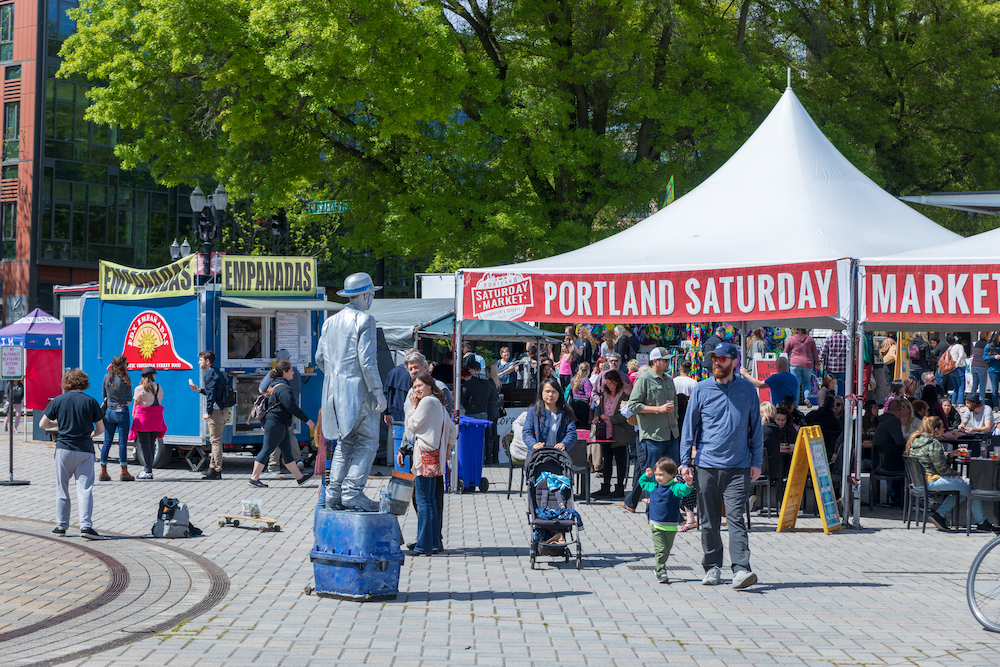Our recent post about Feeling Great in the Body You Have mentions the importance of healthy lifestyle choices, including “Eating the Rainbow.” Connecting with some of the Portland area’s local farmers is one of the best things you can do to eat a rich, rainbow-worthy array of seasonal fruits and veggies throughout the year.
Whether you do that by visiting local farmers’ markets, taking day trips to take a farm tour, or you sign up for a farm’s CSA (community-supported agriculture) program, relationships with local farmers provide you with high-quality nutrients that support seasonal wellness.
3 Ways to Connect With Local Portland Farm Products
Here are three ways you and your family can connect with local Portland farmers and their products.
1. Visit year-round and seasonal Farmer’s markets
Our community is very fortunate and has many year-round and seasonal Farmer’s markets to choose from. Visiting a farmer’s market is a great way to meet your Farmer or their team members face-to-face. You can ask all kinds of questions about their farming practices and anything else you want to know about their livelihood. Most Farmer’s market booths provide samples of some of their products and often provide recipes or tips for preparing produce or herbs you’re unfamiliar with.
Year-Round Farmer’s Markets in Portland
Some of the year-round – or nearly year-round – markets in this area are:
- Hollywood Farmer’s Market. This one is open every Saturday from 8:00 to 1:00
- PSU Farmer’s Market. PSU hosts Farmer’s markets in multiple locations. The days and times vary, but each of their five locations is open for five hours once a week.
Seasonal Farmer’s Markets in and around Portland
Things get pretty exciting around late spring and early summer when Farmer’s markets pop up in virtually every neighborhood in Portland. We recommend visiting the Oregon Farmer’s Market Association’s page that provides In-Person Market locations. You can punch in the type of products you’re looking for, your Portland zip code, and other specific filter information to see what’s happening in the Farmer’s Market scene near you. Most seasonal markets are open from May through October (plus or minus some weeks), when harvests are the most abundant.
2. Sign up for a local farm CSA share
Community-supported agriculture (CSA) is essential for small farms to remain in business. In this model, community members pay a fixed price per week – or per box – depending on the CSA’s subscription offerings. In return, you’re guaranteed a fresh box of seasonal produce or other farm products.
Most CSA’s focus on fresh produce and may offer other add-ons like dairy products, eggs, or other farm offerings. Others, like Moomaw Family Farms, offer shares of their meat products. This gives you access to poultry, beef, and pork that is sustainably raised and respectfully processed. Farm-fresh, sustainably raised meat is free of hormones and antibiotics, is leaner than commercially-raised meats, and tastes better, too!
Visit the Local Harvest website to search for CSA programs near you. While some CSA’s require you to pick up your box at specific times and locations, others (like Hood River Organic) provide home deliveries to Portland area residents.
3. Take a trip out to a local(ish) family farm
When was the last time you visited a family farm? Maybe it’s time to take a family day trip. This is an excellent way for the whole family to see where their food comes from and how it’s grown. You can also pick or harvest produce to take home. Many farms offer tours, allowing you to pet some of their tamer animals or ride on a tractor.
One of our favorite examples is Our Table Cooperative in Sherwood. Just a little more than 30 minutes takes you into a special world where farmers work to create a resilient and interdependent local food culture. Talk about supporting seasonal wellness for all of us! They host year-round events, offer CSA shares, and make absolutely delicious woodfire pizzas you can munch on before or after visiting their farm store. We recommend using the Local Harvest page linked above to find more farms to visit over the course of the next year.
Additional Benefits of Connecting With Local Farmers
There are many reasons to connect with local farmers beyond personal health and immunity boosting.
- Eating local is better for the environment.
- Children tend to eat what they’ve picked themselves.
- Families expand their palates and are encouraged to try new produce, ingredients, and recipes they wouldn’t have otherwise.
And visiting family farms helps to diminish or end picky eating! Farmers have all kinds of ideas on how to prepare vegetables or ingredients your kid turns their nose at. For example, kids who say they hate Brussels sprouts may gobble them up when they’re shaved thin and sauteed. Roasted broccoli may taste better than steamed. How about adding shredded carrots or broccoli to your next turkey or meatloaf?
Bonus Tip: If you haven’t already, check out PANW’s partnership with Kids Eat In Color to bring patients the BetterBites course. This is an incredible resource for discovering what causes picky eating and how to understand your child’s eating behaviors, learning scripts for how to talk about food and build healthy relationships with food long-term, and gaining strategies for avoiding food battles.
PANW Hopes You Shake a Farmer’s Hand Next Month
As we spring into spring and then summer, the team at Pediatric Associates of the Northwest hopes you have the opportunity to connect with a local farmer or two. Shake their hands, give gratitude for what they do – and then get inspired to plan healthy, immunity-boosting meals that support seasonal wellness.





